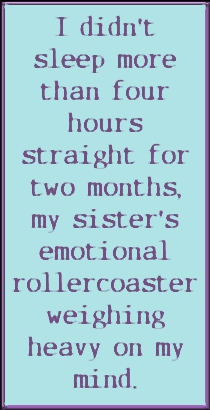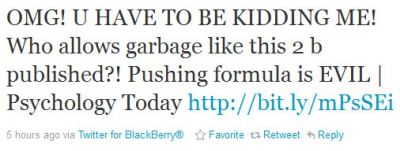Last summer. It was terrifying.
My heart skipped a thousand beats and my butt barely clung to the edge of my office chair when “I’m at the hospital. I’ll call you back” were the last words my mother said before the call ended. My eyes filled with tears. That lump in my throat, hard as a fist, reached down and wrenched my guts.
Rewind a few months, and I will tell you why.
It was the end of April, 2010 when a pretty yellow envelope peeked at me from inside the mailbox. It was addressed to me; my sister’s chicken-scratch handwriting a dead giveaway she was the sender. The cutest card adorned with white buttons and a pastel tree slipped out of the envelope. A cutesy font read “Your Family Tree is Growing More Beautiful Each Day”. Oh my God. I read it over and over, the blurb “See you in November” on the inside written in the same chicken-scratch handwriting.
Excitedly I fumbled with my cell phone to take a photo of myself, card next to a wide grin, and send it to my sister. Within minutes she was calling. An immediate barrage of questions ensued. “Yes, I really am pregnant. No, we don’t want to know what it is. Yes, I already told you I AM PREGNANT. Yes, mom knew. We wanted to wait until we were past the first trimester in case something happened.”
I was happy for her. For them. Really I was, but I couldn’t push aside some strange feeling that something wasn’t right. I could hear a smile in her voice, but it was entwined with a sort of sadness. Why didn’t she tell me? I’m her big sister… she could tell mom, but not me? My mind tried to recount the last month or two, searching my memory for something I may have said, or not said, or did or didn’t do. She had been quiet. Her calls had been infrequent.
A few weeks later I confronted my sister. She said she’d been a little down, and having morning sickness. And wanting to sleep a lot. She’d been real tired. Ding ding! I asked her about her meds. The antidepressants. I know my sister, and when the depression starts looming her recourse is to retreat to her bed and stay. For days.
At one point she broke down and cried. I encouraged her with whatever uplifting words I could muster. And then I asked her, “Have you talked to your doctor about this? Pregnancy blues are one thing, but you sound miserable. You really should talk to her.”
And that was the beginning of a long, horrible pregnancy.
I can’t even really recall what happened, or when, or why. But I do know that one summer morning I called my mom, her breath strained and that tone in her voice, “I’m at the hospital. I’ll call you back.” I was scared to death. I managed, somehow, to call my mother when she was walking into an emergency room at a hospital three hours away from where she was supposed to be.
My sister had been admitted by her OB. Delusional and suffering anxiety attack after anxiety attack, an orange band was secured around her wrist. Her shoelaces removed. Her purse and its contents taken. She had been placed on a suicide watch.
 The psych ward became her world for a week. My sister had access to psychiatrists, therapists, and even a nutritionist due to a discovery of an eating disorder she had hidden for years. They tried all the pregnancy-safe drugs available, supplements, diets and exercise. But it didn’t help. My sister’s downward spiral was in full force and moving fast.
The psych ward became her world for a week. My sister had access to psychiatrists, therapists, and even a nutritionist due to a discovery of an eating disorder she had hidden for years. They tried all the pregnancy-safe drugs available, supplements, diets and exercise. But it didn’t help. My sister’s downward spiral was in full force and moving fast.
After she had been hospitalized for a third time, their last resort was electroconvulsive therapy, or ECT. Most patients receive benefits from this treatment, especially pregnant women since it doesn’t harm the baby. I was shocked (no pun intended) and buried myself with articles, anything I could read and get my hands on. My mom had quit her summer job and resorted to living with my sister and her husband, desperately trying to hold it together herself. I became my mother’s confidant. At times she would call, and I’d listen to hours of tears and sniffles.
I believe I didn’t sleep more than four hours straight for two months, my sister’s emotional rollercoaster weighing heavy on my mind.
By October, emotionally spent and drained, my sister had been through it all – gestational diabetes, high blood pressure, preeclampsia, tremendous weight gain, nightmare after nightmare. Her doctor agreed it was time to induce. At 34 weeks she gave birth to my beautiful niece, weighing 4 lbs 14 oz and a headful of silky hair.
But the fight wasn’t over.
Due to the medications, my niece was unable to eat for 24 hours. Even more depressing news, my sister was unable to breastfeed. My mother still scared out of her mind. And then the news that my niece would have to stay in the NICU for four weeks blew my sister down like a violent midnight tornado.
My sister and her husband finally brought their daughter home, it was so foreign. Here was this baby that was in her belly, but had been taken and cared for by these other women. For four weeks. And now she was stuck, all alone, with this tiny person she didn’t know. Loved? Yes, with all her heart. Bonded? No. Once they brought her daughter home, it was as if she’d stepped in the path of a freight train; her world had been turned upside down as it went from being self-sufficient to OMG WTF I have this crying thing 24 hours a day.
As weeks went by, my sister called every couple of days to vent. Until one day she had called me twice a day, at work, for two weeks straight. I had had enough. And as much as I wanted to say “Get the f**k over it. Put your big girl panties on. Shit or get off the pot”, I knew I couldn’t. And until she decided she wanted to do those things, it was pointless to waste my breath.
Now. I’m going to tell you something about being a big sister. No matter how bad you get pissed off, or irritated, or want to haul off and slug your little sister(s), you still love them with all your heart. When they hurt, you hurt. When they’re happy, you’re happy. But when they’re miserable and can’t do anything about it, you do what ever it takes, come Hell or high water, to open their eyes. To fill their heart with golden love and make their soul sing. You roll up them sleeves and take charge. Why? Because you’re THE big sister. That’s why.
For me, taking charge meant scouring the Internet for hours, looking for postpartum resources until my tired eyes would send me into a migraine. I looked up mother’s groups, even though I knew my sister wouldn’t go. Short of myself driving 12 hours in order to MAKE her go, I knew it was impossible. I have a husband, and a daughter, too.
One day (and I’m still not sure quite how it happened) I was on twitter, when a tweet caught my eye. Someone I had been newly following, a friend of a friend sort of thing, tweeted something about motherhood and then put ‘#ppdchat’ at the end. My eyes got huge. I’m telling you, I’m pretty sure I pee’d my pants with excitement. And being the bossy move-out-of-the-way big sister that I am, I simply tweeted: Need #ppdchat info.
I still tear up about it, like right now, but this simple tweet changed my sister’s life. The power of social media came to my rescue. And somehow I am sure God had a hand in it. It all happened so fast that within ten minutes I had a message from Lauren Hale, of My Postpartum Voice, giving me her email. Within 24 hours I had been in contact with a therapist whose office is located five minutes from my sister’s house. FIVE MINUTES. TWITTER. WOW.
It has taken time, months, and will probably take years for my sister to heal. She is receiving help, guidance, and nurturing to become the mother she has always wanted to be. I know it’s not easy. I mean, I had a touch of depression after pregnancy. Nothing to the magnitude my sister has endured. And I hope I never will.
I do know this. Never be afraid to speak up for someone who can’t. Someone so down and distraught is neither sinking nor swimming, just stuck treading water. There’s nothing to be ashamed about. Do not be afraid to reach out and grab a hand for help. Do not be afraid to try. Do not be afraid.
Go. Do. Be.







